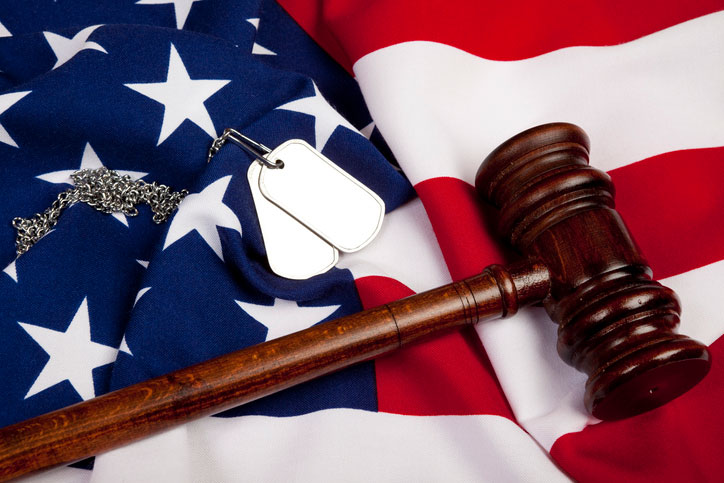
The appearance of U.S. Department of Defense (DoD) visual information does not imply or constitute DoD endorsement.
There is one thing that you will find consistently in every part of the American military: commanders love rules! Where and how you can walk, when you must salute, how you should dress… there are rules for everything in the service. And woe unto anyone who disregards them!
So in that kind of environment, it’s only natural that there is a big role for attorneys to play.
The Judge Advocate General’s Corps, or JAG, is well-known to the American public through the TV series JAG, which spent ten seasons exploring the wide world of military legal practice and spawned a number of spinoffs in the equally popular NCIS family.
Every branch of the military has its own lawyers to not only help organize and manage all the rules and regulations, but also to protect and defend the service and service members under the law. It’s an important part of the discipline and commitment that makes the American military the best in the world.
Being a part of that military legal service is a great path to becoming a respected lawyer in the civilian world, too. It’s a tremendous education in the purpose and meaning of a rules and order-based society. And that’s exactly the purpose of a law degree.
Explore Your Military Training and Degree Options
In or Out of the Service, Legal Experts Keep Organizations on the Right Track
Law and order is often considered one of the most necessary bases for a civil society. All individuals are considered equal under the law in the United States. Everyone has a right to effective legal representation. And society itself relies on laws being applied effectively in order to guide us on the track set out by democratically-elected representatives who make those laws.
The law represents a great bastion in defending our society from both internal and external threats. Today, it’s surprising to many Americans that one of the greatest of those threats foreseen by our founders was the military itself. So some of our most fundamental laws are all about separating civilian and military rule.
Lawyers on both sides of that divide help keep that line bright and clear. But they do so using the same skills, the same critical reasoning abilities, and the same knowledge of legal code. That creates a clear opportunity for turning military legal training into a civilian career as an attorney.
Military Legal Jobs Offer Discipline and Interesting Case Work
 Although JAG explored plenty of ripped-from-the-headlines stories, let’s get something straight: work as a military lawyer is not going to involve going undercover as a SEAL or flying a jet to decoy a nuclear missile away from an aircraft carrier.
Although JAG explored plenty of ripped-from-the-headlines stories, let’s get something straight: work as a military lawyer is not going to involve going undercover as a SEAL or flying a jet to decoy a nuclear missile away from an aircraft carrier.
Military lawyers handle plenty of mundane legal work, from filing briefs to researching precedent for environmental impacts of training exercises. They write up powers of attorney for other service members and offer advice in disciplinary matters. There’s no escape from paperwork and research in any legal job!
But that’s not to say that the job is boring. More interesting are responsibilities with respect to interpreting the law of armed conflict, investigating and prosecuting courts martial, and setting and evaluating Rules of Engagement for deployed forces.
JAG lawyers are often forward-deployed to quickly resolve important questions on targeting and force protection measures when minutes count.
Military lawyers act as investigators to ensure that rules and laws have been followed during combat engagements. JAG staff are found in command posts around the world, advising combatant commanders in diverse areas of conflict and international law.
Civilian Lawyers Are Indispensable to Resolving Disputes in Modern Society
Civilian legal work is, if anything, even more varied than military law. Actually, you can still work in military law, if you want! Civilian lawyers are sometimes hired to represent soldiers accused of crimes, and the military also contracts out to civilian legal specialists in various areas.
But you also have the whole wide world of the law to choose from. Everything from immigration law to environmental work to international trade offers something of interest to just about anyone.
Degrees in the Law Open up Opportunities Outside the Legal Profession

A degree in law opens up a lot more opportunities than just becoming a lawyer. The law is a basic element of society, and understanding it at a deep level gives you advantages in running a non-profit, starting a charity, or entering public service. Put that together with the kind of experience and personal qualities that a military background have to offer, and you can achieve extraordinary success in many different fields.
Just ask Richard Kinder.
Kinder earned his JD in 1968 and joined the Judge Advocate General’s Corps in the U.S. Army. He spent three years in the service and was stationed in Vietnam for a year, seeing the best and worst of people.
After he got out, he found work as a lawyer in the energy industry. After a while, he got together with a college buddy, William Morgan, and started buying up pipeline.
By 2014, Kinder was a self-made billionaire, listed on the Forbes List of Richest People in the US. Forbes also reported in 2020 that he was one of America’s richest living veterans. His law degree helped him get there.
Lawyers spend a lot of time behind a desk, researching and writing. Although in the popular imagination they spend a lot of time in courtrooms arguing cases, that’s actually a minor part of most legal jobs. In fact, many lawyers never see the inside of a courtroom. Those that do will spend many days in preparation for every hour they actually argue a case.
Salaries That Come With a Law Degree Make the Hard Work of Becoming a Lawyer Worth It
You already know that being a lawyer is one of the highest-paying and most respected jobs available in American society. If your parents, teachers, or other authority figures wanted to push you toward some well-paid position of responsibility in the adult world, you can be sure that the first two words out of their mouth would be “Doctor or lawyer.”
They weren’t wrong. According to the Bureau of Labor Statistics, the average annual salary for lawyers in 2021 was $127,990. That’s more than double the average salary for all Americans. And it’s not a ceiling: the top ten percent of lawyers make over $208,000 per year. Maybe even WAY over… BLS stops counting at $208,000, so it’s hard to say what the real number is.
The Bureau also expects demand for those jobs to remain strong. Between 2020 and 2030, the openings for lawyers are expected to grow by about 9 percent. That’s right in line with the rest of the American economy. So there are good odds that a fine legal mind with the right degree and a background of military training will have no trouble getting a high-paying job in law.
A Specialized Degree Is Required for Anyone Who Practices Law
About that degree, though: like doctors, lawyers are licensed. And in most states, just like with doctors, lawyers are required to earn a specialized degree to prepare them for the job: the Juris Doctor (JD).
The Doctor of Law degree is a graduate-level professional degree that offers not just theoretical and academic training, but also a practical set of instruction in how to practice law.
If you’re familiar with the usual degree levels in American colleges, this can be a little confusing. A doctorate is typically the final degree offered in any field. But in law, the LLM, or Master of Laws, typically offer specialization in some particular legal expertise and are taken after earning a JD.
In both cases, you will have to earn a bachelor’s degree first. Many students prepare for legal studies with a bachelor’s in pre-law, but that’s not a requirement. In fact, many law schools look for diversity in their admissions process. And you can develop useful subject-matter expertise by picking an undergraduate program in a field aligned with where you plan to specialize as a lawyer. A degree in environmental science, for instance, is a good foundation for environmental law.
Juris Doctor Curriculum Is Extremely Challenging by Design
 Law school coursework is not like other college classes. Most courses will grade you entirely on the basis of a final test. They are typically conducted in the Socratic style, with a great deal of class participation and education through discussions in class. It’s a fascinating and exciting education for those who can keep up.
Law school coursework is not like other college classes. Most courses will grade you entirely on the basis of a final test. They are typically conducted in the Socratic style, with a great deal of class participation and education through discussions in class. It’s a fascinating and exciting education for those who can keep up.
A JD traditionally requires three-years of post-graduate study, usually very carefully regimented and organized. Students are referred to as being a 1L, 2L, or 3L depending on their year of training, and most law schools tend to cover similar subjects during each year.
1L – The first year of law school is generally considered the most challenging. With a lot of new information and a teaching style that is different from most undergraduate courses, it can be overwhelming… a bit like basic training for lawyers.
- Criminal and Civil Procedure - Separate courses in the two major areas of law help ground you in further studies as well as give you a taste of the different career paths available in those fields.
- Constitutional Law - You will be calling this course ConLaw by the end of your first class, just like everyone else. The building blocks of the American legal system are important for all lawyers to understand and adhere to throughout their careers.
- Torts and Contracts - As the basic codes that govern business and personal dealings, contract and tort law studies help familiarize you with basic obligations of individuals and companies under the law.
- Legal Writing and Research - If you don’t like to read and write, you’re not going to have much fun with a career in the law. Legal writing is a very specific skill to develop for clarity, concision, and accuracy that you will use throughout your career. Legal research is the flip-side of this, teaching you to read, understand, and investigate laws and judgements in every field of law.
2L – Your 2L year offers a little breathing room and the chance to focus on coursework that lines up with your goals as a lawyer.
- Specialty Electives - As a 2L, you get to pick more of your own coursework. You can start piling up classes in specific areas that will be useful in your specialty area, like:
- Evidence
- Tax law
- Corporate law
- Criminal procedure
- Professional Responsibility - Ethics are a foundational quality in American law, and the ABA mandate that every law student take a course in appropriate behavior and responsibilities in the legal system.
- Moot Court and Law Review - 2L students begin to develop specific skills for the practice of law. These can include writing for the school legal journal and participating in mock court proceedings called moot court.
3L – The final year of law school is usually about polish and practical experience. You’ll make connections outside the school and get that real world experience you need to be ready for the courtroom.
- Legal Skills - You’ll further polish your practical legal skills as a 3L, taking classes like Trial Advocacy or Prosecution Clinics, or participating in Legal Aid programs sponsored by the school
- Practical experience - Internship and externship experiences are often a key part of the 3L year. 3Ls may also take on responsibilities managing or overseeing moot court and other proceedings for lower level students.
Law school is fundamentally about critical thinking and learning the process of legal reasoning. There are few courses where memorization or other tricks will get you through. You’ll need to develop on-the-fly abilities to assess and evaluate cases… pretty similar to the kinds of high-pressure decisions you face in the military.
Internships and Clerkships Offer Real World Experience in Legal Practice
 Coming into the practice of law is one of the last great bastions of the traditional apprenticeship style of education. Although no one calls it that, a heavy emphasis is placed on putting new prospective lawyers out into actual legal practices, where they can learn at the feet of professionals.
Coming into the practice of law is one of the last great bastions of the traditional apprenticeship style of education. Although no one calls it that, a heavy emphasis is placed on putting new prospective lawyers out into actual legal practices, where they can learn at the feet of professionals.
So you’ll likely find internship and externship opportunities either required or heavily encouraged during law school. These can take place during any of the three years, but are most frequent and lengthy for 3Ls.
Naturally, each JAG Corps offers internship opportunities, so you will have a chance to join an active legal or command staff in action. There’s no requirement that you have any other military experience or even any commitment to joining, so this is a great chance to experience military law before you join up.
Clerking is another venerable tradition for law school students and graduates. These are similar to internships but are generally paid positions.
Students may clerk for law firms while still in school. Judicial clerks are typically brought on after graduating from law school.
In both cases, clerks take on more responsibility for research, drafting, and legal discussion. It’s typically limited to a one-year term, but during that period you make valuable connections and learn a great deal about the practical applications of the law.
Certain Legal Specialties Can Tie Together Your Military and Law School Expertise
Legal codes cover almost every conceivable part of modern life. Building codes regulate how houses are built… environmental law determines which trees can be cut down and which can’t… financial transactions and contracts are covered in minute detail… there are even laws about laws in the field of administrative law, governing how codes are passed and implemented.
That means you can specialize in just about any subject that interests you as a lawyer. Chances are you will be able to find a JD program somewhere in the country that offers a concentration in that area.
Some concentrations that are particularly relevant to military practice include:
- Administrative law - Most military rules and regulations are basically administrative codes.
- Environmental law - As one of the largest land owners in the country, the military has to deal with environmental responsibilities all the time.
- International law - The law of war is just one example of international law; with installations around the world, military lawyers develop familiarity with many kinds.
- Admiralty law - Navy and Coast Guard JAG attorneys have to become intimate with the law of the sea.
- Cybersecurity law - In the newest frontier of modern combat, military and civil laws become mixed together. JAG lawyers help define the edges and follow the threads.
- Criminal law - JAG lawyers find themselves working on both sides of criminal cases in violations of the UCMJ.
Passing the Bar Is a Requirement for Both Military and Civilian Lawyers
Whether you are becoming a lawyer before or after your military service, passing the bar is a necessary step in earning a law license.
Bar exams are offered on a state-by-state basis, with a focus on the law and court system of that state. This isn’t a big deal if you are planning to practice as a civilian lawyer there, but like other military personnel, JAGs are transferred regularly to locations where the military most needs them.
Fortunately, there’s a special provision in federal law that allows judge advocates to pass the bar in one state, but practice anywhere they are sent.
Finding Military Friendly Schools Offering Law Degrees
 Since you actually have two educational steps to becoming a lawyer, you are probably going to have to do this dance twice. First, you will need to choose a school to earn your undergraduate degree. Next, you’ll need to find the right law school for pursuing your JD.
Since you actually have two educational steps to becoming a lawyer, you are probably going to have to do this dance twice. First, you will need to choose a school to earn your undergraduate degree. Next, you’ll need to find the right law school for pursuing your JD.
Although the order in which you do this depends on the path you take to a legal career, you can leverage your military or veterans education benefits either way. In both cases, you’ll want to find schools that help you make the most of those benefits.
There is no single definition used to determine whether a school is military friendly or not. Instead, you’ll have to look at them on the basis of the benefits and services they offer that line up with where you are in your education. Some important things to consider will be:
GI Bill® Acceptance
For veterans, the GI Bill® is the single biggest educational benefit available. It can cover up to 36 months of school, at the highest in-state public school tuition rate, plus housing allowance, plus money for books and supplies. You can use it either for graduate or undergraduate programs.
Yellow Ribbon Program support
For out-of-state or private school students, even the generous GI Bill® rates can fall short. So the Yellow Ribbon Program is offered by some colleges to help fill in the gaps. For law students, who will always benefit from a degree near where they plan to practice, this can be huge.
On-campus ROTC
All military lawyers are officers, so the Reserve Officer Training Corps is one gateway on that path to the service. Around 1,700 schools across the country support ROTC, and you can count on all of those to be military friendly.
There are also other features like campus veterans support groups, special tuition rates or acceptance policies for vets, and dedicated academic counseling. You can find out about all these features and more through the VA’s GI Bill® Comparison tool on their website.
Putting Your Military Education Benefits to Work Earning a Law Degree
 If you get the idea that earning a JD is no joke, you’re dead right. You can expect to spend seven years in college between getting the necessary bachelor’s degree to get admitted to law school, and then completing law school itself. Getting the right degrees at the right schools to make your career boom like a 155mm howitzer won’t be cheap, either.
If you get the idea that earning a JD is no joke, you’re dead right. You can expect to spend seven years in college between getting the necessary bachelor’s degree to get admitted to law school, and then completing law school itself. Getting the right degrees at the right schools to make your career boom like a 155mm howitzer won’t be cheap, either.
So you are probably asking yourself at this point how exactly you can make service in the military work for you to help earn a degree in law.
You can come at getting a law degree via military service in two different directions:
- Earn your Juris Doctor before joining the service and become a military officer through a Direct Commissioning program.
- Enter the military immediately and use either active duty or veterans’ educational benefits during or after your service to pursue a law degree.
Although these are very different paths, they both end up in the same place. As a military lawyer, on the first path, you’ll get valuable practical legal experience in real-world casework. As a service member on the second path, you can explore other military legal jobs and get access to benefits that will help you pay for law school.
In both cases, you come out the other side with everything you need to become a lawyer.
Earning Your Law Degree Before Entering the Service
 JAG TV theatrics aside, the military is fully aware that qualified lawyers don’t join up to jump out of airplanes or become tank commanders. You’re going to spend your time in offices and courtrooms. Your status as an officer is going to be primarily a technical matter—you aren’t expected to lead troops under fire.
JAG TV theatrics aside, the military is fully aware that qualified lawyers don’t join up to jump out of airplanes or become tank commanders. You’re going to spend your time in offices and courtrooms. Your status as an officer is going to be primarily a technical matter—you aren’t expected to lead troops under fire.
So it would be a bit of a waste to put lawyers through the full range of standard officer training. Instead, if you already have a JD you will probably be commissioned through a direct commissioning program.
This is the primary path to becoming a military lawyer in any service. Most have different qualifications, such as higher age limits, for DCOs (Direct Commission Officers). Your service obligations may also vary from the typical commitment. And in most cases, your training will be abbreviated from the typical officer candidate school term.
In the Marine Corps, Every Lawyer Is a Combat Leader
 Marine Corps JAG service is an exception to the rule that legal professionals undergo less intensive initial officer training.
Marine Corps JAG service is an exception to the rule that legal professionals undergo less intensive initial officer training.
That’s because all Marine officers are considered line officers. They have to be fully qualified to command any kind of unit in the Corps. In the other services, JAG lawyers work exclusively in staff roles—jobs that function in support roles with specialized training and focus on the law.
But a Marine lawyer might have to go from arguing appellate cases in a courtroom right to the front of a landing craft in the Fleet Marine Force, leading a company across a beach under fire.
This means they have to undergo the same tough Officer Candidate School courses as every other Marine officer. No marshmallow s’mores and sleepovers for Marine DCOs—an intensive 10-week grind through swampy obstacle courses and live-fire exercises await you at Marine Corps Base Quantico.
Because of their qualifications and training, it’s not unusual for Marine Corps lawyers to skip back and forth between operational and legal assignments. In fact, recent holders of the highest legal billet in the Corp, the Staff Judge Advocate to the Commandant, have also been wounded and decorated for their actions in combat, commanded training battalions, and served as team leaders in Provincial Reconstruction Battalions.
Are There Ways To Get Pre-Service Military Education Benefits for Law School
Direct commissioning programs assume you are coming in the door having already earned a JD and paid for it out of your own pocket. But there are a few ways you can get education benefits to help with law school costs before you even join up.
Because law degrees are offered at the graduate-level, even a pre-service benefit like ROTC (Reserve Officer Training Corps) that traditionally helps pay for a bachelor’s degree, by itself, won’t be enough.
You might pursue a regular commission through ROTC and consider a program like FLEP (we’ll tell you all about FLEP a bit later) that pays for law school.
But the military is eager to get fully-trained lawyers commissioned, so there are some tricks you can use to leverage ROTC as a path to law school. These are only available to Air Force and Army ROTC cadets; Naval midshipmen don’t have any similar options.
- Educational delay - ROTC students in their fourth year can request an educational delay before commissioning to give them enough time to attend law school. This doesn’t offer tuition
- Reserve duty - The “R” in ROTC does stand for Reserve, even though most graduates in fact pursue active duty assignments. But if you choose to enter a reserve component directly after graduation, you then have plenty of time to attend law school around your reserve obligations… and may be able to take advantage of reserve educational benefits to help pay for it.
The Marine Corps also offers a program called PLC-LAW, or Platoon Leaders Class-Law to college seniors accepted to law school. This is a type of DCO program, but you attend OCS and become commissioned prior to attending law school. Although you are placed on inactive status for school, when you are admitted to the bar and go on active duty you retain credit for those three years in your service record. This has the effect of increasing your time-in-grade, which means bigger paychecks and faster promotions.
JAG Lawyers Get Many Experiential and Educational Benefits During Service
 Just as different states have different codes on the books and require that you pass a state bar in order to practice, the military has its own laws. The Uniform Code of Military Justice (UCMJ) is the primary legal code that governs every branch of the military. It has considerable differences from civilian laws—and that means that even after attending law school, military lawyers also have to receive special training in the laws and legal procedures outlined by the UCMJ.
Just as different states have different codes on the books and require that you pass a state bar in order to practice, the military has its own laws. The Uniform Code of Military Justice (UCMJ) is the primary legal code that governs every branch of the military. It has considerable differences from civilian laws—and that means that even after attending law school, military lawyers also have to receive special training in the laws and legal procedures outlined by the UCMJ.
There are three different schools that offer this training:
- Naval Justice School - NJS offers instruction to Marine Corps, Navy, and Coast Guard personnel in the fundamental of military justice and other matters subject to UCMJ.
- Judge Advice General’s Legal Center and School - The Army operates this Center to run the Officer Basic Course for DCO judge advocates. Known as The JAG School, it has the distinction of being the only military law school accredited by the ABA, and the only ABA-accredited legal program that does not award JD degrees.
- Air Force Judge Advocate General’s School - The Air Force runs their own JAG training program at Maxwell Air Force Base in Alabama.
Each of these schools train not only JAG lawyers, but also the military equivalent of paralegals and other enlisted personnel who work in the JAG Corps. They also offer continuing education and other courses to hone your expertise in military law.
The Army’s JAG School also offers a Master of Laws degree (LLM) to experienced candidates from every service.
Of course, you also get all the benefits of the experience you rack up on the job as a JAG lawyer. Every assignment builds your practical expertise and experience. If you choose to depart for the world of civilian law, your legal mind will be honed to a sharp edge that any law firm will pay top dollar to have.
Using Active Duty or Veterans’ Benefits To Earn a Law Degree After Joining the Service
Not everyone has the means to earn a JD, or even a bachelor’s degree, before entering the military. And in many cases, you may not even know you want to become a lawyer yet.
But that’s just fine. There are a lot of ways that Uncle Sam will support you along the way if you decide to pursue a law degree during or after your service. You can also use some service jobs to get familiar with legal work before you go to the time and trouble of earning a law degree.
How to Pick Military Jobs That Offer Legal Training
Just like the civilian legal system, there are plenty of people working in the military justice system who aren’t full-fledged lawyers. These enlisted and warrant officers have duties similar to paralegals or legal clerks in the civilian world. That offers both experience and training that can boost your chances in law school later on.
- Army - 27D Paralegal specialists and 270A Legal Administrators
- Navy - Legalman
- Air Force / Space Force - 5J Paralegal
- Marine Corps - 44 Legal Services and Court Reporter Marines
- Coast Guard - Yeoman
You can also get some relevant experience in criminal law through military police and master-at-arms specializations that offer military law enforcement training.
Some of these billets offer opportunities for similar kinds of continuing education and advanced training as paralegals or legal administrators in the civilian world. All of them come with extensive preparation in service schools for handling the basic jobs required in any legal office:
- Preparing legal filings
- Performing basic case investigations and interviewing witnesses
- Undertaking preliminary legal research
That kind of experience also offers a strong boost to your law school applications.
Paths to Law School Exist for Both Officers and Enlisted Personnel
The military is all about training. There are no shortage of options to get a college education while you are still on active duty.
Even if you enter the service as an officer or enlisted rating in another specialty, there are programs available to help you transition to the JAG Corps as a lawyer.
Exactly what programs will help you the most depends on where you are starting out. The more advanced and specific military training programs aimed at law degrees all require that you have a bachelor’s degree before you apply.
But through options like Military Tuition Assistance or enlisted commissioning programs that offer ROTC scholarships, you can get that degree while still in the service, too.
Funded Legal Education Program (FLEP) / Funded Legal Education Training (FLET) Pay for Law School While You Are in The Military
Officers or enlisted personnel on active duty can pursue a law degree and have it fully paid for through the Funded Legal Education Program. Offered by both the Army and Air Force, FLEP fully covers tuition, fees, and offers a book and supply allowance. FLET is the Navy version of the program. Even better, you remain on active duty and get your full pay and regular allowance during the entire time you are in law school.
Officers accepted in FLEP remain in their same grade, while enlisted applicants attend OCS/OTS and receive commissions on graduation.
FLEP is a competitive program. The Army, for example, only funds 25 FLEP slots per year. On top of meeting the military’s high standards for acceptance, you’re entirely responsible for qualifying for and getting accepted to an approved law school as well. And, of course, that means you must already have earned a bachelor’s degree.
Credentialing Opportunities Online Bolster Legal Credentials on the Military’s Dime
Every service offers COOL as an educational benefit, although you need the approval of your commander. COOL is a system that catalogs civilian professional license and credentialing opportunities and connects them to military job specialties.
With approval, you can use COOL benefits to spend up to $4,000 toward getting any of those licenses or certifications. That can include testing costs or necessary coursework.
In the legal field, that can help you qualify for certifications such as:
- Certified/Registered Paralegal
- Board Certifications in Consumer/Business Bankruptcy Law
- Estate Planning Law Certification
- Certified Legal Investigator
Any of these can boost your odds of getting accepted to law school after discharge, or bolster your case for higher salaries as a lawyer.
Military Service Improves Your Chances in Any Law Career
 Whichever path you decide to pursue to a degree and a career in the law, military service offers you not just financial educational benefits and real-world experience. It also delivers some solid lessons in qualities that make people successful in school and in life.
Whichever path you decide to pursue to a degree and a career in the law, military service offers you not just financial educational benefits and real-world experience. It also delivers some solid lessons in qualities that make people successful in school and in life.
You’ll come out of the service with a genuine appreciation of discipline, order, and commitment. You will find mental fortitude and internal resources that few other people ever uncover. And you will be stamped with a strong moral and ethical code that can be crucial in the practice of law.
No matter where you are starting from, the qualities that often come with a stint in the military could help to get you closer to earning a law degree.
2021 US Bureau of Labor Statistics salary and job growth figures for Lawyers reflect national data not school-specific information. Conditions in your area may vary. Salary and job growth data accessed in June 2022.





